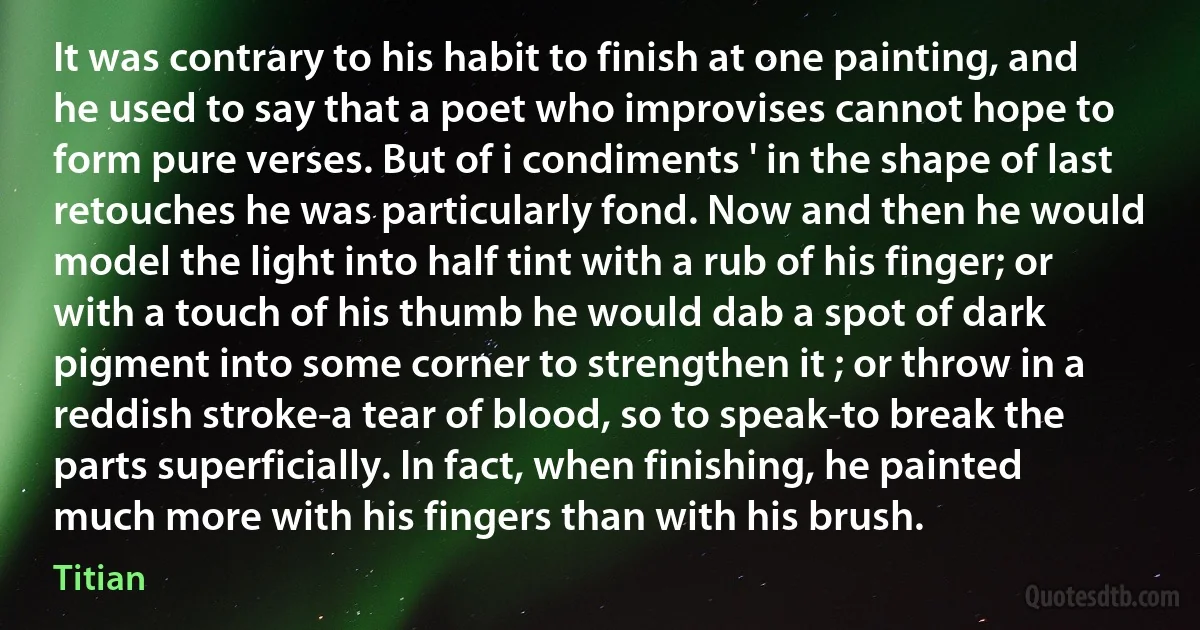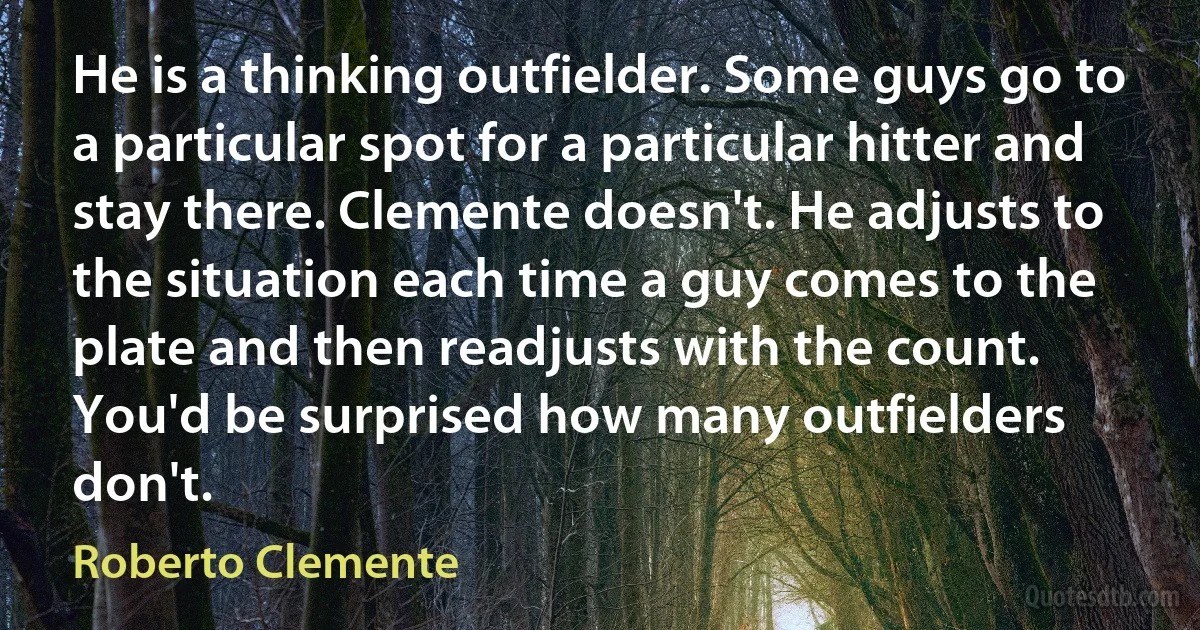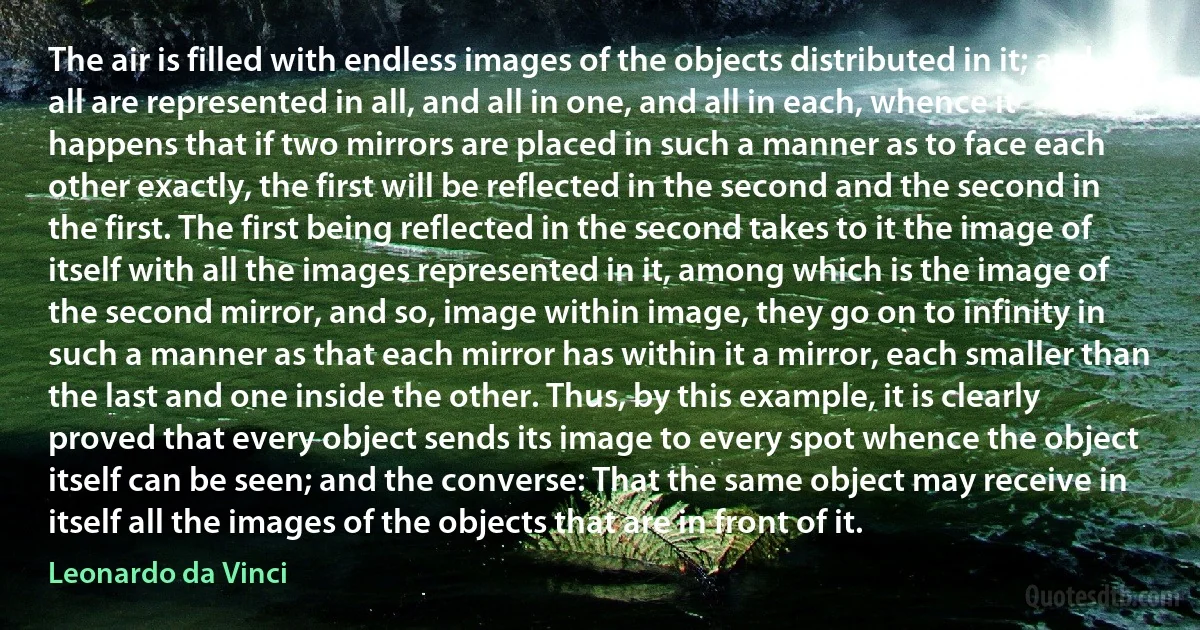Spot Quotes - page 30
The little band of chosen disciples whom He had selected as repositories of His teachings were thus deprived of their Master's physical presence ere they had assimilated His instructions, but they were souls of high and advanced type, ready to learn the Wisdom, and fit to hand it on to lesser men.
The Master did not forget His promise to come to them after the world had lost sight of Him,[167] and for something over fifty years He visited them in His subtle spiritual body, continuing the teachings He had begun while with them, and training them in a knowledge of occult truths. They lived together, for the most part, in a retired spot on the outskirts of Judæa, attracting no attention among the many apparently similar communities of the time, studying the profound truths He taught them and acquiring "the gifts of the Spirit."

Annie Besant
It was the habit of Titian to paint pictures for the places they were intended to fill, and in this he fol- lowed the traditions of all the schools. Sketching and laying in the subjects so far as he was able in his workshop at home, he took the canvas to the spot in which it was to hang, and finished it there.

Titian
My Soul gave me good counsel, teaching me not to measure time by saying, "It was yesterday, and will be tomorrow." Before my Soul taught me, I imagined the past as an era not to be met with, and the future as an age that I would never witness. But now I know that in the brief moment of the present, all time exists, including everything that is in time - all that is eagerly anticipated, achieved, or realized.
My Soul gave me good counsel, teaching me not to define a place by saying 'here' or 'there'. Before my Soul taught me, I thought that when I was in any place on the earth I was remote from every other spot. But now I have learned that the place where I subsist is all places, and the space I occupy is all intervals.

Kahlil Gibran
It is not wise warfare to throw your ammunition to the enemy unless you throw it from the cannon's mouth. But if you can compel the enemy to waste his ammunition by drawing his fire on some thoroughly protected spot; if you can, by annoying and goading and harassing him in all possible ways, drive him to the last resort of stripping bare his tyrannous and invasive purposes and put him in the attitude of a designing villain assailing honest men for purposes of plunder; there is no better strategy.

Benjamin Tucker
Beloved soulmate.. ..you'll kiss my ass at least seven times if I manage to convince you from the crazy happiness I got from living here [Madrid].. ..the various insects with their deadly weapons, made of needles and penknives, which, if you don't look out and even if you do, will tear away your flesh and your hair as well.. ..and you can't find a spot far enough away from them to escape their cruelty. This infection is general in every town..

Francisco Goya
Harmony thus appears as a temporary adjustment, established among all forces acting upon a given spot - a provisory adaptation; and that adjustment will only last under one condition: that of being continually modified; of representing every moment the resultant of all conflicting actions. Let but one of those forces be hampered in its action for some time and harmony disappears. Force will accumulate its effect; it must come to light, it must exercise its action, and if other forces hinder its manifestation it will not be annihilated by that, but will end by upsetting the present adjustment, by destroying harmony, in order to find a new form of equilibrium and to work to form a new adaptation. Such is the eruption of a volcano, whose imprisoned force ends by breaking the petrified lavas which hindered them to pour forth the gases, the molten lavas, and the incandescent ashes. Such, also, are the revolutions of mankind.

Peter Kropotkin
There's a knock at the door, and Valentino and Dr. Emeterio enter. This is it. Suspense really isn't good for someone with my condition, and every second of silence is brutal. "What's up?" I ask, wanting to get this over with, one way or the other. "It's nice that something good will come out of this," Valentino says, pressing his hand to his chest. My heart skips a beat, two, ten, a hundred, a thousand, a million, and somehow, I don't die on the spot. In fact, I'm going to live. I'm going to live, live, liv, live, live, live, live, live, live, live, live, live.
But first, he has to die.

Adam Silvera
I've never seen a ball hit farther in Wrigley Field than the home run Roberto Clemente sent flying out in the ninth inning. It passed out of view over the left-center bleachers and it must have gone close to 500 feet. Clemente says he never hit one that far before and even the Cubs admit it was the first one they ever saw leave the park at that spot. Ernie Banks said later he never hit one over that fence and never saw one hit as far as this one. Even Rogers Hornsby acknowledged it was the longest he ever saw hit at Wrigley Field.

Roberto Clemente
[Clemente] goes back to the ball he hit in Wrigley Field, Chicago. He rates this one No. 1 for distance, perhaps 600 feet. Clemente, himself, paced off the distance from the centerfield wall to the scoreboard right above and when he was shown the spot where the ball landed, he knew this was No. 1. "I hit one off Sam Jones one night over the left-center fence at Candlestick Park and that was a good one," he said. "And two I remember off Sandy Koufax. One over the right field fence at the Coliseum, the other here at Forbes Field. This one hit a transformer on the left-field light tower on the way up and it stopped. No telling how far it might have gone. And you remember I came within a few inches of putting one on the right field roof here.".

Roberto Clemente
During the Series, after arriving in Baltimore, Roberto practiced for hours studying how the ball caromed off the right field fence at different angles and locations. His determination was of such a magnitude that one could be excused for believing he'd gone crazy. Crazy like a fox is more like it, as the World Series would ultimately demonstrate; time after time, Roberto, having left nothing to chance, would appear in precisely the right spot to field each carom. For me, Roberto Clemente has to be the greatest right fielder of all time.

Roberto Clemente
Baseball won't be the same in Pittsburgh without Clemente. When you think of baseball in Pittsburgh, you think of Clemente. There's no way to replace him. We will just fill the spot. I'll see Roberto every time I see a great play. That's where we'll miss him most – on defense. We'll have to do the routine flawlessly because we won't get the spectacular as often.

Roberto Clemente
Before I threw the ball I prayed a little bit to God: "Please let this pitch be in a good spot for him not to hit it too hard." I think I was lucky enough to throw the ball in a good spot. It was a ground ball out. I remember one time in Pittsburgh – I struck him out three times. I think that was the greatest day in my life.

Roberto Clemente
Roberto Clemente was such an awesome hitter. I never knew how to pitch him. You could throw the ball a foot inside and he'd hit a line drive down the left field line. Throw it a foot outside and he'd hit a home run over the right field fence. Dick Selma was pitching in Forbes Field one time and it was a tight spot late in the game. Roberto was up with a chance to beat us, and Westrum came out to the mound. He knew that if you threw the ball inside or outside, Roberto could still hurt you. So he said, "Throw one right down the middle of the plate, letter high. He won't be looking for it there.” Sure enough, Roberto hit it 400 feet, but he hit to dead center field for an out.

Roberto Clemente
When we have once known Rome, and left her [...], we are astonished by the discovery, by-and-by, that our heartstrings have mysteriously attached themselves to the Eternal City, and are drawing us thitherward again, as if it were more familiar, more ultimately our home, than even the spot where we were born.

Nathaniel Hawthorne
He [Válmíki] was the son of Varuna, the regent of the waters, one of whose names is Prachetas. According to the Adhyátmá Rámáyana, the sage, although a Bráhman by birth, associated with foresters and robbers. Attacking on one occasion the seven Rishis, they expostulated with him successfully, and taught him the mantra of Ráma reversed, or Mará, Mará, in the inaudible repetition of which he remained immovable for thousands of years, so that when the sages returned to the same spot they found him still there, converted into a valmik or ant-hill, by the nests of the termites, whence his name of Válmíki.

Valmiki
The eye - which sees all objects reversed - retains the images for some time. This conclusion is proved by the results; because, the eye having gazed at light retains some impression of it. After looking (at it) there remain in the eye images of intense brightness, that make any less brilliant spot seem dark until the eye has lost the last trace of the impression of the stronger light.

Leonardo da Vinci
Over at our place, we're sure of just one thing: everybody in the world was once a child. So in planning a new picture, we don't think of grown-ups, and we don't think of children, but just of that fine, clean, unspoiled spot down deep in every one of us that maybe the world has made us forget and that maybe our pictures can help recall.

Walt Disney
Look at all of Bo's hos, lookin' for a ride on Bo's hose
And I spot a little Latino, booty so big, call it "Oprah's ego"
We go to it, through it / She says "¡Dios mia, mi amigo!"
Pull it out, stick it in your mouth, and I bust in the back of ya
"Swallow bitch! There's people starvin' in Africa!"

Bo Burnham



